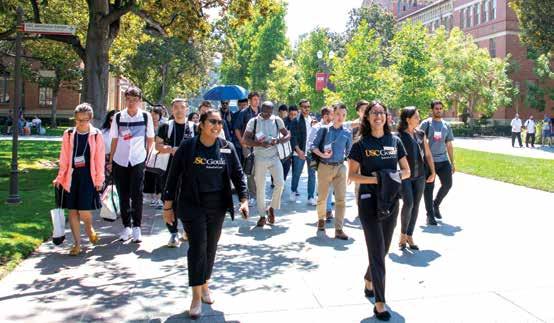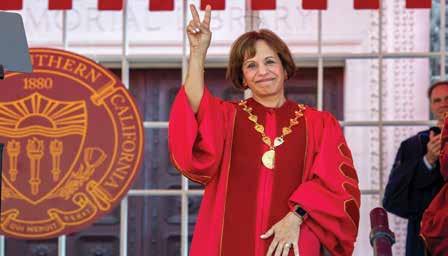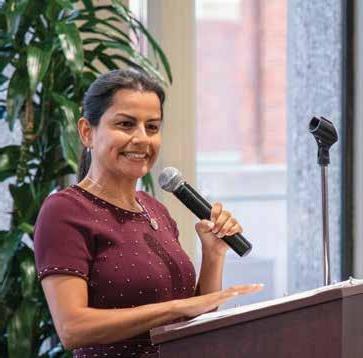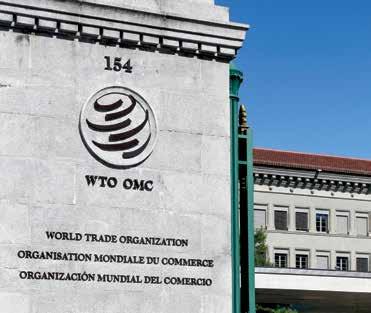
13 minute read
BRIEFS
The USC Gould School Graduate and International Program (G&IP) recently welcomed its newest class of students, hailing from 40 countries representing six continents, all looking forward to a new academic year that features two new program launches and the five-year anniversary of USC Gould’s online programs.
For the 2019-2020 academic year, student course offerings include a new LLM in International Business and Economic Law (IBEL) and the oncampus Master of Studies in Law (MSL).
“USC Gould is thrilled to be at the forefront of legal education,” says Misa Shimotsu, assistant dean of G&IP programs. “This year, we introduce our Master of Studies in Law and Master of Laws in International Business and Economic Law in response to the evolution of law in society and the market. Together, our wide range of programs has drawn the most geographical and professionally diverse class yet.”
Another academic year milestone includes the first class of Progressive Degree Program undergraduate students set to graduate this spring with an MSL degree, following the launch of the G&IP’s on-campus MSL program.
The professional backgrounds of this year’s incoming class range from patent law and intellectual property to real estate, law enforcement and health care. Many incoming students are attorneys or hold licenses to practice law in their home countries.
This year’s class also includes three exchange students, from Bocconi University in Italy, Bond University in Australia and the University of Hong Kong.
In addition, 2019-2020 marks the five-year anniversary of USC Gould’s online programs, including the 16th cohort of the online LLM and certificate programs, and the 10th cohort of the online MSL and online certificate programs.
USC Gould Graduate and International Program students tour the USC campus during orientation.
GOULD ADMISSIONS DEAN DAVID KIRSCHNER NAMED TO LSAC BOARD OF TRUSTEES
David Kirschner, the USC Gould School of Law’s associate dean of admissions and financial aid, was appointed to the Law School Admission Council (LSAC) Board of Trustees and will serve as the inaugural chair of the Emerging Markets and Innovation Committee.
“I look forward to being an advocate on behalf of my admissions colleagues as well as providing strong moral and ethical leadership,” said Kirschner, whose two-year appointment began in May.
Composed entirely of law schools, LSAC is a nonprofit organization promoting quality, access and equity in law and education by supporting the student enrollment process and providing assessment, data and technology services.
USC CELEBRATES PRESIDENT CAROL L. FOLT’S INAUGURATION GOULD QUOTABLES
The Trojan Family came together on Sept. 20 to enthusiastically welcome Dr. Carol L. Folt, an experienced academic leader and life scientist, who was formally inaugurated as USC’s 12th president.
The event underscored Folt’s philosophy of putting students at the center of the university, as well as honoring and facilitating the contributions of faculty and staff.
In her inaugural speech, Folt, former chancellor of the University of North Carolina at Chapel Hill, who also served as provost and interim president at Dartmouth University, talked about the importance of diversifying access to higher education and positioned USC as an academic center that will be at the forefront of solving major societal challenges. She pointed out four specific areas in which USC will show its leadership over the next decade: • Expanding affordability, reducing the burden of huge student debt for college graduates. • Furthering sustainability, taking effective and extensive actions to lower the carbon, water and waste footprints of the USC campuses and the L.A. region. • Embracing the urban future, solving problems faced by major world cities and leveraging the power of USC’s schools in new ways and in partnerships with USC’s neighbors. • Emphasizing areas where USC has a distinct advantage — in creative, entrepreneurial and technological arenas, as well as medical research and treatment in areas including cancer, personalized medicine and Alzheimer’s disease.
“We’re at our best when we’re sparking imagination, and when we’re channeling it toward finding solutions that are innovative, sustainable and just,” she said.

If we think that informed and engaged shareholders play an important role in disciplining company management, the rise of index investing is a problem.”
Prof. DOROTHY LUND on how index funds rarely challenge management decisions and pay packages, Reuters, Oct. 8, 2019.
I wish the judges were directed to ask more pointedly, why does the recipient lack the job market skills, and to give longer-term spousal support when the reason for being out of the job market is to care for children.”
Prof. SCOTT ALTMAN on California alimony law, KPCC-FM, Sept. 17, 2019.
There’s considerable evidence that people with the same crime and the same conviction do a lot worse in jail when they have a mental illness.”
Prof. ELYN SAKS on deaths and injuries of inmates with mental challenges, San Diego Union-Tribune, Sept. 24, 2019.
DEAN GUZMAN LEADS USC LATINO GROWTH INITIATIVE

USC Gould School of Law Dean Andrew T. Guzman is leading the USC Latino Growth Initiative (LGI), an innovative effort that aims to enhance vital pathways for Latino growth, advocacy and leadership at USC, in the community and beyond.
“The USC Latino Growth Initiative aspires to amplify existing efforts to strengthen the bonds between the university and the largest ethnic group in California, advancing the long-term prosperity of both,” says Guzman, the first Latino dean of USC Gould.
The mission of the USC Latino Growth Initiative is to engage alumni from across the university, scholars, decision makers and community members, forging important connections between the Latino community and USC, along with providing support for key educational initiatives. Its work is centered on four broad pillars: • Student Access: Increasing Latino scholarships and enhancing K-12 educational partnerships. • Student Success: Focusing on support programs to bolster inclusion, retention, degree completion, full-time employment and graduate-level study. • Research and Policy: Furthering research and collaboration on significant policy issues affecting Latino populations. • Community Impact: Building relationships with local governments, citizen groups, alumni and friends to create strategic programs and opportunities.
Student Access
Student Success LGI
Research & Policy
Community Impact
—Dean Andrew T. Guzman
In September, the initiative hosted an action gathering at the law school, bringing together more than 20 alumni who are leaders in business, government, nonprofits and academia to discuss near-term opportunities and longterm plans. Dean Guzman and Congresswoman Nanette Barragán (JD 2005) delivered remarks at the event.
This academic year, the initiative’s focus is on scholarships and support for existing Latino students. For those interested in joining this effort, please contact Margaret Kean, assistant dean of development, at: mkean@law.usc.edu
Rep. Nanette Barragán (JD 2005) made remarks at an action gathering for the LGI.
CENTER FOR TRANSNATIONAL LAW AND BUSINESS PRESENTS AT WTO PUBLIC FORUM

The lack of harmonized procedural standards in antitrust regulatory actions among different countries creates challenges and market access uncertainty for tech and other large multinational companies. Opening up a discussion on solutions, the USC Gould Center for Transnational Law and Business (CTLB) proposed ideas — including a new multilateral agreement — to harmonize procedural standards for antitrust regulatory actions at the 2019 World Trade Organization (WTO) Public Forum in October. The panel drew a standing room-only audience.
“We were excited that our proposal for this presentation was accepted,” said Prof. Brian Peck, CTLB director. “Presentations are usually made by government leaders, the United Nations, the International Chamber of Commerce or other wellestablished international organizations. We wanted to put ourselves out there as the lead on this issue.”
The WTO, a global, international organization that oversees and negotiates the rules of trade between nations, convened its annual forum in Geneva, Switzerland.
The panel discussion focused on creating a multilateral agreement through the WTO that would harmonize processrelated rules, essentially creating common standards for due process, transparency and comity, Peck said. Panelists included global experts from academia, developing countries, trade policy and the private sector. Peck and Fangfei Dong, associate director for policy, research and programs, co-moderated.
Peck noted that although the topic is viewed with wariness by some nations, the presentation was well-received by key international organizations.
“We were honored that WTO and United Nations Conference on Trade and Development officials attended our presentation” he said.
CTLB facilitates interdisciplinary collaboration, teaching and research, and brings together leading global academic experts, practitioners and policymakers to consider improvements for international business activities.
—Leslie Ridgeway
Gould’s Center for Transnational Law and Business attracted a great deal of interest in its panel presentation at the World Trade Organization Public Forum.
IMMIGRANTS AND GLOBAL MIGRATION INITIATIVE COORDINATES IMMIGRATION WORK AT USC
The USC Immigrants and Global Migration Initiative (IGMI), a Provost initiative housed in the Gould School of Law, coordinates and advances immigration-related work being done around the university through research, advocacy, education and service. In the year and a half since its inception, Director Eliane Fersan says IGMI has collaborated with 14 schools, eight departments and 13 student organizations, building a core of 150 Trojan volunteers.
When ICE raids created an environment of fear for many, IGMI took steps to aggregate updated information on campus resources for USC’s DACA and undocumented population. IGMI also coordinated sending USC experts, including lawyers, doctors and social workers, to the U.S.-Mexico border detention centers to help families.
IGMI is currently developing a USC immigration ecosystem map in order to link members of the USC community, external partners and other universities. In addition, IGMI is working on an Immigration Court Monitoring Program aimed at evaluating and protecting fairness of practices and procedures. —Matthew Kredell
Meet Jennifer Westhoff Zayas (JD 2013), vice president of business and legal affairs at Annapurna Pictures, where “no day is ever boring and no day is ever the same.”
HOW DID YOUR EDUCATION AND EXPERIENCES AT USC GOULD PREPARE YOU FOR YOUR CAREER?
The classes and the certificate programs are well thought out to prepare you for practicing. Many of the entertainment-based classes are taught by practitioners who really emphasize giving you the skills and knowledge to be a contributor to your firm or company from day one. The most valuable things that USC gave me, though, were access to people who could give advice and act as mentors and experiences that legitimately boosted my resume and skill set. Nothing is going to be handed to you, but Gould does a remarkable job of giving students any resource they could need to succeed whether academically or in their practice.
HOW WOULD YOU DESCRIBE YOUR CURRENT ROLE?
I am the vice president of business and legal affairs at Annapurna Pictures. I get to make the deals for underlying IP, producers, directors, writers and on-screen talent for all of our movies and TV shows (and sometimes even video games and Broadway productions). I also get to stay with the projects as they are produced (either handling on-set and below-the-line issues myself or overseeing outside counsel) and eventually released (where I get to review marketing and promotional materials related to the project, and hopefully an awards campaign). Being in-house counsel means that I also get to deal with corporate matters affecting the company at large. No day is ever boring and no day is ever the same.
ARE THERE ANY LESSONS FROM YOUR DAYS AS A LAW STUDENT THAT YOU RELY ON IN YOUR CURRENT WORK?
It’s a small world. The legal profession is small and the entertainment industry is even smaller. No matter how contentious a negotiation gets, there’s a good chance that at some point I’m going to have to work with that person again. So I try to build a rapport wherever possible and not take anything personally. I also obsessively check attachments on emails before I send them after I made that mistake once with a final paper.
WHAT IS YOUR FAVORITE OR MOST REWARDING PART OF WHAT YOU DO?
I feel like I’m helping to create something. I get to work with projects from the first time a creative executive discovers a book/podcast/story/script that would make a good film or TV show through development, production and eventually release for the world to see. Plus, my mom earns major cool points with her friends when she points out my name in the end crawl.
WAS THERE A PROFESSOR OR COURSE YOU FOUND PARTICULARLY INSPIRATIONAL?
Professor Jack Lerner was always so supportive and such a champion for students. He made the concept of intellectual property rights tangible and showed a lot of us different career paths in the IP world we didn’t know existed. He invited us to attend practitioner events like the Los Angeles Copyright Society and was always available to provide advice. Also, Tara Kole (a partner at the talent boutique Gang Tyre) taught a wonderful entertainment contracts class. It really opened my eyes to the importance of understanding the business and your client’s goals when negotiating contracts. And now I get to negotiate deals with her!
Nicole Gates (JD 2013) San Diego
ALUMNI SPOTLIGHT: Q&A WITH JUSTIN HOYT
Justin Hoyt earned his LLM in alternative dispute resolution from USC Gould in 2018 and has successfully steered his career toward arbitration since then. Wearing many hats, Hoyt is an arbitrator; discovery referee and mediator; a research attorney at JAMS Mediation, Arbitration and ADR Services; and a lecturer in law at USC Gould. In addition, he’s an experienced litigator, who clerked for federal and state judges in California and New York before coming to USC.
WHY DID YOU CHOOSE TO PURSUE YOUR LLM IN ADR AT USC GOULD?
In researching ADR programs, the faculty at USC stood out to me. I ended up choosing USC for the impressive group of renowned legal and ADR professionals teaching there. It was clear they were serious about preparing ADR students for careers in the field.
Also, I was excited to enroll in a program in which many of my fellow students were already established professionals in the field.
Finally, I have to mention the Trojan Family benefit. It’s real!
CAN YOU TELL US ABOUT YOUR CURRENT WORK?
In addition to teaching Arbitration in the U.S. and ADR Clause Drafting at USC, I primarily serve as a research attorney to a select group of JAMS arbitrators and discovery referees. The work is great. JAMS is the leading domestic provider of ADR services, and the cases are all top-notch in terms of complexity and interest.
At the same time, I have my own growing practice as a neutral. Fortunately for me, my professional roles are all well-aligned. I enjoy meeting and getting to know people, hearing their stories, and building relationships and trust with counsel and disputing parties. I really enjoy the challenge of developing my reputation as a neutral, despite coming from what many would consider to be a less conventional background. While students are frequently told that successful arbitrators are all retired judges or former BigLaw partners, I decided somewhat early in my legal career to steer toward ADR, and I don’t regret it.
WHAT SURPRISED YOU MOST ABOUT THE LLM PROGRAM?
I was pleasantly surprised that courses featured a mix of students: LLM in ADR, JD and international students. Class participation resulted in hearing variations of these three different perspectives — it was a terrific opportunity to learn not just from the professors, but from my fellow students.
HOW HAS GOULD PREPARED YOU PROFESSIONALLY, BOTH CURRENTLY AND FOR FUTURE PROSPECTS?
My degree from USC opened a lot of doors. Excelling in class while also getting to know faculty outside of class allowed me to build my network. It ultimately also helped me join the USC Gould faculty, as teaching was something I had long hoped to do. I’ve also benefitted from networking with classmates, many of whom continue to work in the field.
WHAT ADVICE WOULD YOU PASS ON TO FELLOW ADR STUDENTS ABOUT THEIR OWN CAREER DEVELOPMENT?
I really made a point to get to know my professors outside of the classroom, regardless of whether or not they practiced in the exact fields I was interested in. Most faculty members at USC have in-depth experience in several ADR sub-fields; they all have day jobs and they teach simply for the love of helping the next generation. Also, our faculty is friendly and well-connected. You never know what is in store for you if you maintain an open mind, even if it appears someone works in a field you may not necessarily be interested in at that particular moment.








